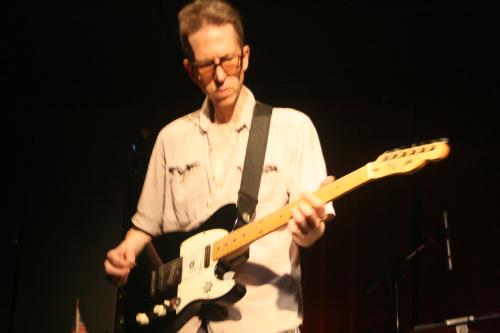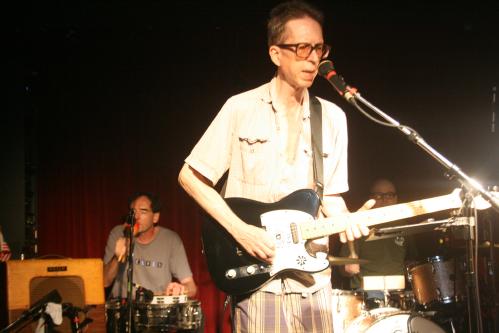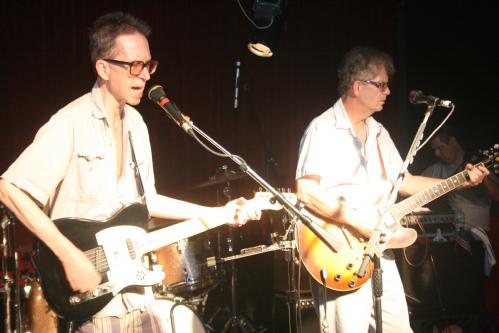
Photo by James Appio

by Jamie Frey
 Since
the early 80’s, Jersey Beat has been dedicated to
the discussion and dissection of rock music from the tri-state
area. This entire time, Glenn Mercer has been an integral
part of the New Jersey scene he comes from. With his fellow
singer/guitarist Bill Million, his band The Feelies has
brought some of the most unique and intellectual sounds
and rhythms to punk and indie music, influencing bands from
R.E.M. to Galaxie 500 to Parquet Courts. The debut Feelies
album Crazy Rhythms I consider one of the best
works of the era, and it was with great excitement that
I got to speak with Glenn Mercer about the Feelies, his
career and rock n’ roll. Since
the early 80’s, Jersey Beat has been dedicated to
the discussion and dissection of rock music from the tri-state
area. This entire time, Glenn Mercer has been an integral
part of the New Jersey scene he comes from. With his fellow
singer/guitarist Bill Million, his band The Feelies has
brought some of the most unique and intellectual sounds
and rhythms to punk and indie music, influencing bands from
R.E.M. to Galaxie 500 to Parquet Courts. The debut Feelies
album Crazy Rhythms I consider one of the best
works of the era, and it was with great excitement that
I got to speak with Glenn Mercer about the Feelies, his
career and rock n’ roll.
Q: I first heard the Feelies at Battery Park on July 4,
2008, which was your comeback show after a very long hiatus
of not performing together as the Feelies. How did that
come about? Did Sonic Youth (the headliner) reach out to
you?
GM: Basically. I guess it was their agent who approached
us. At that point, I think ’91 had been our last show.
We had been receiving offers for a while at that point,
as well as offers to reissue our records. So it was just
a good time for everyone in the band to do it.
Q: I was in college at the same and it seemed that right
around that time, people my age really started to discover
a lot of indie rock that hadn’t really been getting
the attention it deserved. The Pixies and Dinosaur Jr. and
Jesus & Mary Chain all reunited about that time and
had very successful tours. The audience just seemed to become
a lot larger for those more fringe, more arty kind of bands.
I did you feel about your audience at the time you decided
to come back from that break?
GM: I guess it was a good time to do it. There was certainly
interest in the band. I’m not sure why that is, I
guess. Just trends, I guess? I suppose enough time had passed
where it was nostalgic for some fans and younger people
were just discovering a lot of that kind of music from the
Eighties and Nineties.
Q: I think you have to go back to that old line about the
Velvet Underground, that only a thousand people bought that
first album but every one of them started a band. That kind
of music just seems to have a much longer life than anyone
could have guessed based on the initial reaction to it,
and I think the same can be said about the Feelies. So let’s
take it back a little. You grew up in New Jersey, as we
all know. When did you pick up the guitar?
GM: I originally started playing bass when I was around
13. I can’t even remember the first songs I learned
how to play. I remember that when I switched to guitar,
it stuff like early Creedence, “Sweet Jane”
was an early song I learned on guitar…
Q: How did you learn about the Velvet Underground, if “Sweet
Jane” was one of the first songs you taught yourself?
Those records were kind of hard to find, especially for
a kid in the Jersey suburbs.
GM: People have to remember that it wasn’t like it
is today, where there are billions and billions of bands
and you can just go online and hear pretty much anything
ever recorded. Back then, you learned about bands from reading
about them, mostly. I had two older brothers who were into
music and had a lot of records, but basically it was pretty
easy to find out about stuff like the Stooges or whatever
just be reading your favorite magazines. There really wasn’t
that much going on, so it wasn’t that hard to find
good music.
Q: From my point of view, I would have thought that bands
like the Velvets and Stooges would have been really obscure
back then, but I guess if you read the right magazines,
they were the primary purveyors of information about that
kind of cool music.
GM: I think people think that because those bands didn’t
get played on the radio. People assume that most people
got exposed by being on the radio, but that really wasn’t
true by the time I was getting into music seriously. It
was probably true a few years earlier, like ’66. You’d
hear a lot of stuff on AM radio, that was pretty much the
only source you’d hear new music. But then FM came
in and albums got more important than singles, and things
just really took off from that point.
Q: What was your first band?
GM: I don’t remember the name, but the first band
that was semi-professional was when I was about 15 or 16,
and we played pretty much every weekend for an entire summer.
That was when I was still playing the bass.

Q: Was Feelies the first band you played guitar in?
GM: No. There was a band called the Outkids first. Originally
we were a cover band and did what was popular at the clubs
around that time. Like, Bowie was big, Mott The Hoople,
things like that. Once we started writing original matter,
the sound veered into the “Nuggets” garage-rock
thing. We did a lot of covers from the “Nuggets”
album and a lot of garagey type stuff. So by the time we
were doing all our own originals and playing in New York,
we were a garage-rock band.
Q: So you’re playing glam, you’re playing garage,
how did you get from that to “Crazy Rhythms?”
Because I have to tell you, that is a record that I’ve
spent a lot of time with. Aside from being great work, it
has one of the most apt record titles I can think of. And
I think that what separates the Feelies from most of your
peers is the rhythm. So how would you characterize the Feelies
beat? I hear som African rhythms, a Bo Diddley beat, and
maybe some krautrock?
GM: Well, I didn’t really listen to that. Dave (Weckerman)
did, but he didn’t have a lot to do with those songs,
he’s not on the first album. But he was definitely
influenced by all that stuff. I don’t care to define
our sound or explain where it comes from. It probably has
more to do with what we leave out than what we put it. I
think the fact that Bill (Million) and I both began as bass
players has a lot to do with our influence, but I’m
not even sure about that. But locking in with the drums,
that’s something that comes from playing bass. I think
you can trace everything back to Bo Diddley or even to African
drums if you go far enough.
Q: Your version of “Everybody’s Got Something
To Hide Except For Me And Monkey” is, to me, one of
the best Beatle covers ever recorded. How did you wind up
with a Beatles cover on your first album?
GM: We were just looking for another song to fill out the
album, really. It didn’t seem all that ambitious or
cocky to us to cover the Beatles because we weren’t
trying to recreate their version. It was more a question
of, how do we take our sound and apply it to a Beatles song?
I think out of all the Beatles covers we’ve done over
the years, each one seems to get further away from the original.
Q: I definitely hear that. It’s like there’s
the Feelies version of the song, and then the way it originally
sounded. That Feelies sound is always first. I never realized
until recently that Crazy Rhythms was originally
released on Stiff Records. I had always thought Stiff was
only British bands. How did you wind up on that label?
GM: I think we just sent them a demo. They were really
one of the only companies that considered our request to
produce ourselves. We did have interest from other labels
but they all wanted to work with a producer, and we didn’t
want any part of that.
Q: Were you a fan of the Stiff roster, like Elvis Costello
and Ian Dury and Nick Lowe?
GM: No. Not at all. That almost steered us away from the
label. They seemed a little too preoccupied with promoting
the label itself rather than the bands on the label. It
was all about the Stiff brand. And in retrospect, I can
see the merit in that kind of approach. But it kind of turned
us off. I guess we realized that an indie label has to promote
itself, but at the time we really had no interest in that
stuff and just wanted them to pay a little more attention
to us. We just though it should be about the music, not
about the label.
Q: So the record came out in 1980. The first wave of punk
was pretty much over at that point. How did people describe
the Feelies at that point? I don’t even know if words
like college-rock or post-punk were being used yet.
GM: Everything was Punk and then it became New Wave. It
was before words like college-rock or jangle-rock came along.

Q: This is all history to me, I came along after all this
happened, so I really find all of this fascinating. I do
consider myself lucky in that I got to play the original
Maxwell’s with my bands a few times. And the Feelies
and Maxwell’s were almost synonymous in terms of music
history. Do you remember how you started playing there?
GM: We were going to England for the first time and we
wanted to do a warm-up show before we left. And for whatever
reason, we didn’t want to play in New York. Maybe
because we had just played there or maybe because we wanted
to try out new material under the radar or something. Our
bass player Keith (DeNunzio) used to go to Maxwell’s
all the time. In fact he worked there. So he had a connection
and he recommended it. I remember going in and thinking,
this isn’t going to work, it’s too small. So
we were getting used to playing the bigger places in New
York City. But that first show was a lot of fun, the energy
level was real high, and it just seemed like the people
there were much more concerned with hearing music that getting
drunk or picking up girls. New York tended to be kinda trendy,
people were always trying to get into the new hot spot in
town and they didn’t even care who was playing. Maxwell’s
was the opposite.
Q: So once you found the place, I know you became a regular
in the scene there. What were some of the other bands you
got to meet and make friends with at that time?
GM: I think we knew the Bongos even before we played Maxwell’s.
They had sent us copies of their first single because they
were big fans of ours. But when we first played there, there
really wasn’t any Hoboken scene yet. That all came
later.
Q: The Bongos were famous for always saying “We’re
the Bongos from Hoboken, New Jersey” wherever they
toured, even back when New Jersey was often just the punch
line to a lot of bad jokes. Did you always consider yourself
a Jersey band and did that influence your career in any
way?
GM: I’m sure it’s influenced us. I guess more
the aspect of being a suburban band than being a city band.
That environment that we grew up in has a lot to do with
our sound. The way I feel when I’m in the city, my
senses just feel overwhelmed. I think our music is suburban
because it has a lot of subtleties.
Q: You mentioned that you started out playing covers, and
the Feelies have always played a lot of covers. A lot of
original bands won’t do any covers but you seem to
take a special pride in yours and they’re always great
choices. How do the Feelies choose covers?
GM: They’re all songs that meant a lot to us by bands
we really like. Most of the songs we cover are pretty well
known by our audience, so it’s not like we’re
feeling a need to turn people on to a specific band. It’s
just music that’s inspired us. It kind of brings it
full circle.
Q: Are there any bands that came after you that really
turned you on, and that you feel might have been influenced
by the Feelies? I’m thinking specifically of R.E.M.
but I’m sure there are lots more.
GM: I guess there are a lot of bands we’ve played
on bills with really stick in my mind, like Husker Du, Rain
Parade, Meat Puppets, Minutemen, fIREHOSE. The Replacements
are a band we all like. We never played with the Replacements
but that’s just a band that comes to mind that we
all really liked who kind of followed in our footsteps.
Q: Do you listen to much new music?
GM: Not really, no. I just don’t have the time, really.
Q: Will there be another Feelies album?
GM: We’re working on new stuff. There’s an
instrumental record that I did this past year, some of those
songs go back around ten years so it’s really a compilation
of stuff I’ve been working on. And then Bar None will
be doing reissues of the Feelies albums Only Life and
Time For A Witness. And then after that we’ll
have a new record. We’re working on new material now.

Q: You released the first new Feelies album in 20 years
in 2011 with Here Before. Do you find that releasing albums
now is more difficult than it used to be, or is it easier
because of the democratization of music on the Internet?
GM: I think the major consideration now is that people
just don’t buy records anymore. That has a trickle
down effect that affects every aspect of what we do. Music
just seems a lot more disposable now. You don’t pay
for something, you just take it for granted. The bands we
were friends with back in the late Eighties all basically
signed to major labels around the same time. And the fact
that all those bands broke up shortly afterward says a lot
about the whole idea of these marginally successful bands
reaching the mainstream. It really was never based on reality;
expectations were just too high on both the band’s
part and the record label’s part. When I was growing
up, there was room for a lot of different stuff, a lot of
different levels. You could have a band like the Stooges,
and then a band like the Rolling Stones, and anything in
between, and it was all acceptable. Everybody could at least
have a chance. Then corporations took over and had to sell
a lot of records and artistry and being original took a
back seat to having mass appeal. Originality wasn’t
rewarded or seen as having value for a long time and now
I think you’ve seen music has shifted away from that
and it became that the only way you can judge something
is by how much money it makes or how popular it is. Everything’s
become a lot more generic.
Q: I’ve been doing a lot of reading up on the Feelies
and it seems like there are certain words that keep coming
up over and over: Tense, nervous, anxious, urgent. The only
other bands I’ve heard described this way are the
Talking Heads and the Modern Lovers. Do you think these
phrases have any merit? Do you consider yourself an anxious
or nervous person? Are those personality traits that affect
your music, or is it all just perception?
GM: I think so, yeah. Less so now, but I’ve always
been sort of anti-social. Shy, nervous, anxious. That’s
always been an element in rock ‘n’ roll in general.
I think being introverted and rocking out have always been
inseparable. The wonder and the beauty of music and rock
is that it allows for that expression and it allows for
those feelings to be validated and shared and work themselves
out. It’s an outlet for frustration. That’s
been a big part of rock ‘n’ roll since the beginning.
JerseyBeat.com
is an independently published music fanzine
covering punk, alternative, ska, techno and garage
music, focusing on New Jersey and the Tri-State
area. For the past 25 years, the Jersey Beat music
fanzine has been the authority on the latest upcoming
bands and a resource for all those interested in
rock and roll.
|
|

